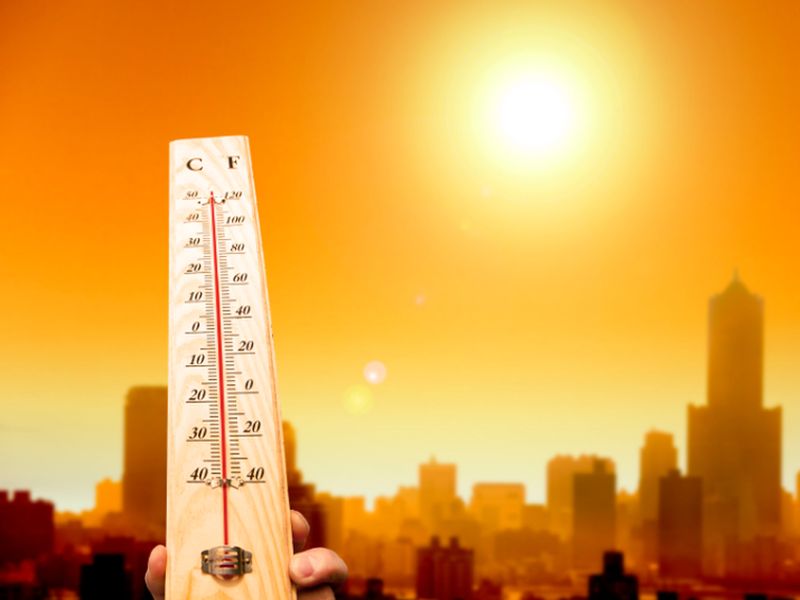

Extreme Heat in Southwest a Deadly Threat
Here's how to protect yourself as temperatures top 120 degreesWednesday, June 21, 2017

WEDNESDAY, June 21, 2017 (HealthDay News) -- With temperatures soaring so high that some planes couldn't take off in Phoenix on Tuesday, the heat wave scorching the Southwest for the next week should be taken very seriously, one emergency doctor warns.
Dramatic temperatures have been recorded in Arizona, California and Nevada, reaching 120 degrees Fahrenheit or higher in some desert cities -- Death Valley, Calif., hit 125 and Palm Springs, Calif., reached 121.
In Phoenix, the thermometer reached a high of 119 degrees on Tuesday, a temperature that has only been matched or exceeded four other times, according to the Associated Press.
That kind of heat can be deadly.
"It's important to remember that extreme heat combined with humidity can kill. Extremes of heat are most concerning to public safety, and a large number of heat-related deaths are generally preventable," said Dr. Robert Glatter, an emergency physician at Lenox Hill Hospital in New York City.
"Infants and children, the elderly, as well as those with chronic medical conditions such as chronic kidney disease, asthma, hypertension and diabetes, are at increased risk for heat-related illness," he added.
Heat cramps and heat exhaustion are the most common heat-related illnesses, Glatter said. Nausea, dizziness and muscle cramping all signal trouble, he said. Your skin may also become cool and moist because you are sweating so heavily.
Heat stroke is an even more serious condition, and considered a medical emergency. Patients may develop body temperatures up to 106 to 108 degrees as they lose the ability to sweat and cool their body, and they might experience confusion and disorientation, Glatter said. Ice baths and misting fans can help reduce core temperatures.
However, "medications such as ibuprofen and acetaminophen are not helpful with such elevated temperatures, and in fact may be harmful," Glatter noted.
And other medications that people commonly take (for example: blood pressure pills, diuretics) affect how hydrated someone is, and they can increase the risk of heat-related illnesses if people don't hydrate properly, he added.
Glatter offered some tips on how to stay safe during a blistering heat wave:
- Drink plenty of cool fluids and stay out of the sun during the hottest part of the day (10 a.m. to 2 p.m.). Wear loose-fitting, light-colored clothing and a wide-brimmed hat. Apply sunscreen before you go outside, and reapply every two hours while outdoors.
- Try to stay indoors where there is air conditioning. If air conditioning isn't available, spraying cool mist on your skin and using a fan can help.
- Limit outdoor activity. If you exercise in the heat for under one hour, drink cool water before and after your workout.
- If you exercise in the heat and humidity for more than one hour, have a sports drink, to replenish the salt lost from sweating. If you prefer, you can have a few salty pretzels instead of a sports drink, Glatter noted.
- Never leave children or pets in a parked car. When it is 90 degrees outside, the temperature can reach more than 150 degrees in the car in 15 to 20 minutes.
Such safety measures will likely become more critical in the coming decades: A new study published in Nature Climate Change this week found that if climate change continues unchecked, three-quarters of the world's population will experience deadly heat waves by the end of the century.
SOURCES: Robert Glatter, M.D., emergency physician, Lenox Hill Hospital, New York City; Associated Press
HealthDay
Copyright (c) 2017 HealthDay. All rights reserved.
News stories are written and provided by HealthDay and do not reflect federal policy, the views of MedlinePlus, the National Library of Medicine, the National Institutes of Health, or the U.S. Department of Health and Human Services.
- More Health News on
- Heat Illness
- Safety



























.png)












No hay comentarios:
Publicar un comentario